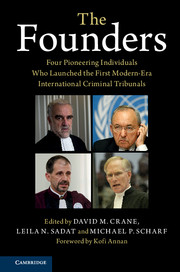 The Founders
The Founders Introduction
from PART I - PUTTING IT ALL IN CONTEXT
Published online by Cambridge University Press: 23 March 2018
Summary
It was with great expectations that I accepted the invitation to write the introduction to a book in which the main part would be personal reflections and perspectives by the founding chief prosecutors of the International Criminal Tribunal for the Former Yugoslavia (ICTY); the International Criminal Tribunal for Rwanda (ICTR); the Special Court for Sierra Leone (SCSL); the International Criminal Court (ICC); and the Extraordinary Chambers in the Courts of Cambodia (ECCC). I was deeply involved in the establishment of all these courts or tribunals, and I therefore looked forward with great interest to the contributions by the prosecutors, as well as the contributions by the other authors, who I had come to know over the years.
The reason for this invitation is of course my involvement with the creation of these institutions. It materialized through a series of coincidences. When I graduated from law school back in 1962, my plan was to become a judge in my own country, Sweden. I therefore immediately took up a position as a law clerk in a circuit court in the countryside. This was the first step in a 10-year period during which I would serve, first, as a law clerk and, later, as a judge in two circuit courts and in two courts of appeal. The main focus of the work in these courts was criminal law. In 1972, I was asked to join the Ministry of Justice to do legislative work. After 13 years in this Ministry, the last three years as the chief legal officer, I became the legal adviser of the Ministry for Foreign Affairs in 1984.
In January 1994, when I had served in this position for over nine years, I received a telephone call from UN Secretary General Boutros Boutros-Ghali, who invited me to join his team as under-secretary general for legal affairs and the legal counsel of the United Nations. For 10 years, from March 1994 to March 2004, I held this position at the crossroads between law and politics – three years with Boutros Boutros-Ghali and seven years with Kofi Annan.
- Type
- Chapter
- Information
- The FoundersFour Pioneering Individuals Who Launched the First Modern-Era International Criminal Tribunals, pp. 3 - 18Publisher: Cambridge University PressPrint publication year: 2018
